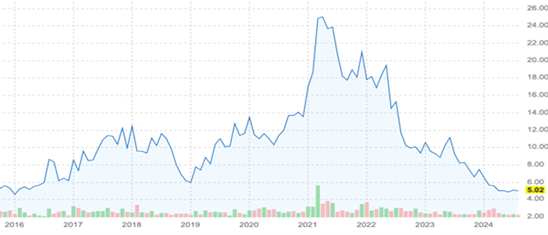It’s the opposite of surprising that exciting tech startups often need to make big changes in tactics and even strategy in their early years. In our portfolio, we label these as Course Correction companies. One I like is MagnaChip Semiconductor Corp. (MX), headquartered in Cheongju, South Korea, highlights George Gilder, editor of Gilder’s Moonshots.
Though that label sounds ominous, the stocks often sell at a deep discount because of their challenges. That offers an opportunity for exceptional returns, assuming management makes the right changes before the clock runs out.
MagnaChip Semiconductor Corp. (MX)
MX has embarked on a bold course correction of its own. Since its spinoff from SK Hynix in 2004, MagnaChip had provided foundry (contract manufacturing) to numerous fabless semiconductor companies. MX’s five (originally) fabs provided the bulk of the company’s revenues, which peaked at nearly $700 million in 2016. The foundry business began to underperform and was sold in 2020 for $435 million. There have been transitional foundry revenues (and costs) since, but they are quickly going away.
(Editor’s Note: George Gilder is speaking at the 2024 MoneyShow Orlando, which runs Oct. 17-19. Click HERE to register)
How does a company spun out of a big firm like SK Hynix 20 years ago qualify as a startup? With the sale of the foundry business, MagnaChip dumped not only its past, but all its debt. It then staked its future on innovation.
It now specializes in designing and manufacturing analog and mixed-signal semiconductor products for a wide array of high-growth markets, including consumer electronics, automotive, industrial, and IoT markets. The company’s Power Analog Solutions (PAS) group focuses on power management ICs, addressing energy efficiency in automotive and consumer electronics. Mixed-Signal Solutions (MSS) makes display drivers and power management ICs specifically for display.
Display driver integrated circuits (DDICs) are specialized semiconductor chips used to control and manage displays in smartphones, tablets, TVs, monitors, automotive displays, and more. DDICs convert the digital data from the device’s processor into analog signals that drive the individual pixels on the display panel, ensuring the correct color and brightness for each pixel.
Both arenas, power control and displays, are becoming more important and more challenging as these markets struggle to balance performance demand with power availability and heat.
MX still faces challenges, including fluctuating demand and the final winddown of its Foundry Services business. But a course correction represents a major shift in a company’s strategy and signifies a new beginning. The recent selloff in global stock markets also makes it a propitious time to accumulate MX shares.
Recommended Action: Buy MX.










